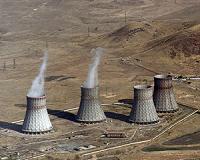 |
Seoul (AFP) March 14, 2011 President Lee Myung-Bak boasted Monday of the safety of South Korean-built nuclear reactors as explosions at an earthquake-hit atomic plant in Japan raised fears of a nuclear disaster. The South Korean leader attended a groundbreaking ceremony for the construction of nuclear power plants during his trip to the United Arab Emirates and said the country would have "top-class" plants. A South Korean consortium has won a $20.4 billion contract to build four nuclear plants in the UAE. "South Korea has the top level of nuclear power plants in terms of safety and efficiency, and they will become a good model in the Middle East," Lee said in a statement quoted by Yonhap news agency. South Korea operates 20 reactors, which generate some 35 percent of its electricity needs, and is eager to export its expertise as a new growth engine for the economy. It plans to build 12 new nuclear reactors in the next 14 years. But two explosions at Japan's Fukushima nuclear plant raised public concerns in South Korea over nuclear accidents. The state-run Korea Institute of Nuclear Safety said it was closely monitoring radiation levels across the country, but said Japan's quake-damaged reactors would not pose a serious radiation risk to the peninsula.
earlier related report "I've been a big supporter of nuclear power because it's domestic -- it's ours and it's clean," Senator Joseph Lieberman told the CBS News television program "Face The Nation" Sunday. Nevertheless "I think we've got to ... quietly and quickly put the brakes on until we can absorb what has happened in Japan as a result of the earthquake and the tsunami," said Lieberman, who is chairman of the Senate Homeland Security Committee. Experts must then "see what more, if anything, we can demand of the new power plants that are coming online." President Barack Obama wants to increase nuclear power as part of a US effort to decrease the nation's dependence on coal and foreign oil. The administration has allocated $18.5 billion in Department of Energy loan guarantees to spur nuclear development. The White House stood by its policy Sunday, but sounded a note of caution. "The president believes that meeting our energy needs means relying on a diverse set of energy sources that includes renewables like wind and solar, natural gas, clean coal and nuclear power," said White House spokesman Clark Stevens told The New York Times. "Information is still coming in about the events unfolding in Japan, but the administration is committed to learning from them and ensuring that nuclear energy is produced safely and responsibly here in the US," the spokesman is quoted by the newspaper as saying. US Representative Edward Markey, a nuclear power critic, called for a moratorium on building reactors in seismically active areas, according to The Times. The disaster in Japan "serves to highlight both the fragility of nuclear power plants and the potential consequences associated with a radiological release caused by earthquake-related damage," Markey said in a statement. Nuclear energy however still has supporters on Capitol Hill. Senator Charles Schumer told NBC's "Meet the Press" on Sunday that the unrest in oil-rich Libya is evidence that "we do have to free ourselves" of dependence on foreign oil. "Prices are up. Our economy is being hurt by it or could be hurt by it. So I'm still willing to look at nuclear. As I've always said it has to be done safely and carefully," the New York Democrat said. Senate Minority Leader Mitch McConnell told the Fox News Sunday program that lawmakers shouldn't make snap judgments. "I don't think right after a major environmental catastrophe is a very good time to be making American domestic policy," the powerful Republican said. Friday's colossal 8.9 earthquake and subsequent tsunami, which sparked an emergency at two of Japan's nuclear power plants and could result in catastrophic meltdowns, has many US nuclear energy advocates thinking twice. Part of a reactor at Japan's aging Fukushima No. 1 atomic plant blew up Saturday, a day after the biggest quake ever recorded in Japan unleashed a 10-meter (33-foot) tsunami. Another explosion shook the quake-damaged power plant on Monday. Excessive radiation levels were recorded at a second Japanese nuclear facility, Onagawa, on Sunday, although authorities insisted the facility's three reactor units were "under control." "It is considered to be extremely unlikely but the (nuclear) station blackout has been one of the great concerns for decades," said Ken Bergeron, a physicist who has worked on nuclear reactor accident simulation. Nuclear opponent Ira Helfand, board member of Physicians for Social Responsibility, said an overlooked threat to nuclear plants is terrorism. "They are essentially weapons of mass destruction that we build ourselves and site next to our cities and thereby hold huge numbers of people hostage to acts of nature or occasionally perhaps acts of man that we cannot control," he said.
Share This Article With Planet Earth
Related Links Nuclear Power News - Nuclear Science, Nuclear Technology Powering The World in the 21st Century at Energy-Daily.com
 Nuclear contamination: The options
Nuclear contamination: The optionsParis (AFP) March 13, 2011 Evacuation, temporary shelter and iodine pills are the chief weapons for protecting civilians against nuclear fallout, experts say. A blast on Saturday that wrecked the concrete shell surrounding the No. 1 reactor at Japan's Fukushima nuclear plant released radioactive vapour but not at levels dangerous for human health, according to Japanese officials. Specialists say the authorities ha ... read more |
|
| The content herein, unless otherwise known to be public domain, are Copyright 1995-2010 - SpaceDaily. AFP and UPI Wire Stories are copyright Agence France-Presse and United Press International. ESA Portal Reports are copyright European Space Agency. All NASA sourced material is public domain. Additional copyrights may apply in whole or part to other bona fide parties. Advertising does not imply endorsement,agreement or approval of any opinions, statements or information provided by SpaceDaily on any Web page published or hosted by SpaceDaily. Privacy Statement |